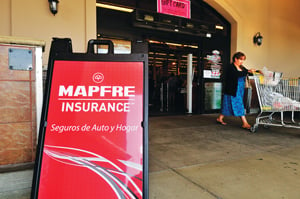
Stop in a Vallarta supermarket and you’ll see something new for sale next to the apples and jicama: auto insurance. Pitched particularly to Latinos, even illegal immigrants.
Madrid insurance giant Mapfre is stepping up its presence in California, with an eye on the state’s Latino population – including undocumented residents who will soon be able to get driver’s licenses, making it far more likely they’ll buy car insurance.
And the Latino market is one where Mapfre executives think they have an edge, thanks to the company’s big presence in South and Central America. Mapfre (pronounced “Mah-fray”) does more business in Latin America than in its native Spain.
“People are waiting for a Hispanic insurance company,” said Antonio Huertas Mejias, Mapfre’s chief executive, who met with the Business Journal on a recent visit to Los Angeles. “If they like to eat Latino food, they’d like to have Latino insurance products.”
And food is part of the company’s expansion plans here. Mapfre has made deals with Latino-focused grocery store chains Northgate González Markets of Anaheim, Vallarta Supermarkets Inc. of Sylmar and El Super of Paramount. They have locations throughout Los Angeles and the rest of Southern California, and Mapfre insurance agents and information kiosks are already in 10 markets and will be in 10 more by year’s end, said Jaime Tamayo, chief executive of Mapfre USA. Mapfre and the grocery chains would not disclose terms of their arrangement.
Tamayo and Huertas met earlier this month with California Insurance Commissioner Dave Jones to discuss their business plans, including selling insurance to undocumented immigrants here thanks to a state law allowing them to get driver’s licenses starting next year.
Jones estimates there are about 1.5 million undocumented drivers who will be eligible for the new licenses, and the vast majority of them don’t currently carry insurance. That means more than 1 million new customers for Mapfre and other insurers.
“It’s a clear opportunity,” Tamayo said. “We believe it’s a positive move.”
A handful of companies – including Mapfre’s California subsidiary Commerce West – already offer auto insurance to unlicensed drivers, though it’s not clear how much of their business is with illegal immigrants. More likely, customers for such policies are foreign workers who are here legally but carry only foreign driver’s licenses.
Jones said the market for auto insurance specifically for undocumented immigrants is probably quite small, as most likely don’t have insurance. But with licenses for undocumented drivers coming soon, Jones said he’s glad to hear Mapfre is interested in insuring those drivers.
“Given their unique cultural understanding and sensitivity to the Spanish-speaking and Latino community, this would present tremendous opportunities for them,” Jones said.
While they’re interested, Mapfre executives cautioned, they have lots of unanswered questions.
“We’re still hashing things out,” Tamayo said. “We need to understand how things are going to work. But we have a positive attitude.”
The Department of Motor Vehicles and Jones’ office are still figuring out how licenses will be issued and how insurers will underwrite policies for drivers with essentially no driving record. Insurance companies judge drivers based on how many years they’ve had a license and how safe they’ve been.
In the case of previously unlicensed drivers, they won’t have access to either of those pieces of information, which could make insurance just as expensive as for a new driver. Too expensive, and drivers might skip insurance, just as they do now.
Pete Moraga, a spokesman for trade group Insurance Information Network of California in downtown Los Angeles, said that other insurers, like Mapfre, see opportunity for new customers but worry about how they’ll underwrite new policies.
“No question there’s opportunity there,” Moraga said. “But underwriters are going to be pulling their hair out. Insurers loathe to guess about anything.”
Publicly traded Mapfre has had operations in the United States since 2008, when it bought Massachusetts insurer Commerce Group, including Commerce West.
Commerce West still exists, selling insurance through independent agents. Some of those agents will continue selling Commerce West-branded insurance, but others will now sell Mapfre-branded policies. Tamayo said Commerce West will offer so-called nonstandard policies – often for customers with bad driving records – while Mapfre will focus on standard insurance.
Along with selling through independent agents, Mapfre plans to sell policies online, through its grocery store kiosks and, eventually, through kiosks at auto dealerships. The company uses a similar multichannel approach in Spain and other markets.
While executives say they are trying to attract customers of all kinds, Latinos are a focus. Mapfre is a major insurer in Mexico, Brazil and Columbia, and bills itself as the largest nonlife insurer in Latin America.
That means residents who have lived in South or Central America likely know the Mapfre name already. Because it knows what customers in those countries are buying, Huertas said, the company knows what kinds of insurance products Latinos in the United States might want.
“For example, burial insurance is not a big product in the states, but in Latin America and Spain, it’s very usual,” he said.
The Insurance Information Network’s Moraga said companies have stepped up their marketing to Latinos, both with advertising in Spanish and with English ads featuring Latino families. In targeting Latinos, Mapfre isn’t doing something new, though the insurer’s use of kiosks in Latino grocery stores seems like a shrewd move.
“This company setting up shop at Vallarta, that’s a great marketing tool,” he said. “You’re going to get exactly the folks you’re looking for.”
